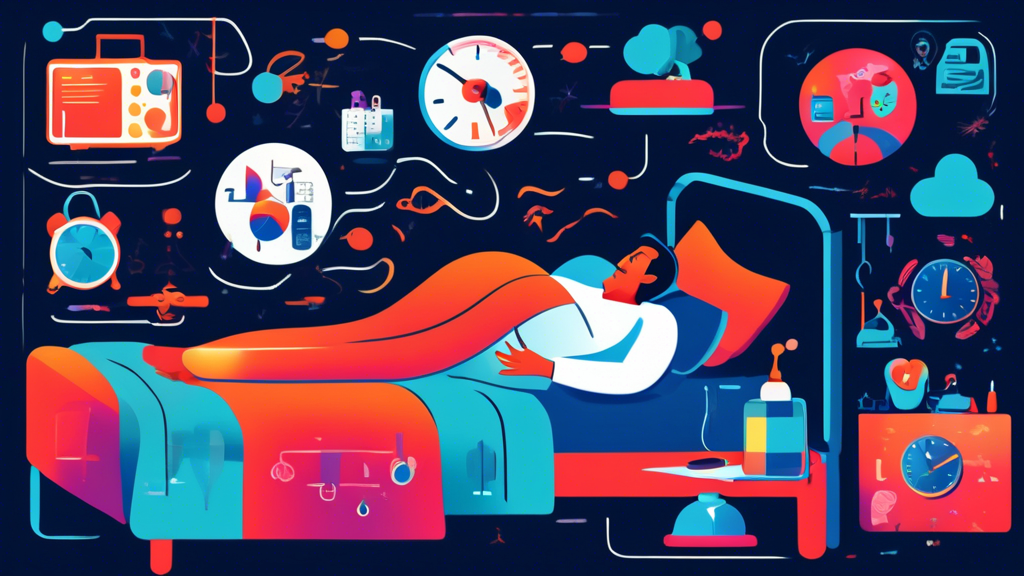The Science Behind Sleep Hygiene for Men
Sleep hygiene refers to the practices and habits necessary to have good nighttime sleep quality and full daytime alertness. It is crucial for overall health, impacting everything from mental acuity to physical well-being. For men, maintaining proper sleep hygiene can yield specific benefits, such as enhanced muscle recovery, improved cognitive function, better mood regulation, and a reduced risk of chronic illnesses. Men are often prone to sleep disorders like sleep apnea and insomnia, which can significantly impair daily activities, highlighting the importance of good sleep hygiene.
Several factors uniquely affect sleep quality in men. Biologically, hormones like testosterone can influence sleep patterns, often affected by age, stress levels, and overall health. Lifestyle choices also play a significant role; diet, exercise, technology use, and stress levels can either contribute to restful sleep or detract from it. Environmental factors, such as the quality of the mattress, room temperature, and lighting, further influence the ability to achieve a restful night’s sleep.
Implementing good sleep hygiene practices is essential for combating sleep disorders and enhancing overall sleep quality. Establishing a regular sleep routine, including consistent sleep and wake times, helps synchronize the body’s internal clock. Adopting healthy sleep habits like a balanced diet, regular exercise, and mindful pre-sleep activities, such as reading or meditation, can also contribute to better sleep. For those struggling with persistent sleep disorders, seeking professional help is crucial. Various effective treatments are available, tailored to treat conditions such as sleep apnea and insomnia. By understanding and prioritizing sleep hygiene, men can achieve better health and a more productive, balanced life.
Understanding Sleep Hygiene and Its Importance
Define Sleep Hygiene: What it is and why it matters for overall health
Sleep hygiene refers to the practices and habits that are conducive to sleeping well on a regular basis. These practices foster the optimal conditions for restful and restorative sleep, which is essential for overall health and well-being. Good sleep hygiene not only helps in falling asleep faster but also ensures that the sleep obtained is of high quality. Poor sleep hygiene, on the other hand, can lead to difficulties in falling asleep, staying asleep, and even result in chronic sleep disorders such as insomnia.
Proper sleep hygiene encompasses a range of behaviors. This includes setting a consistent sleep schedule, creating a restful sleep environment, managing stress, and avoiding substances that can impair sleep, like caffeine or nicotine. Making sleep a priority is also a critical component of sleep hygiene. Given that sleep impacts virtually every aspect of our health— including immune function, mental clarity, and emotional stability— maintaining good sleep hygiene is integral to living a healthy life.
The Role of Sleep Hygiene in Men’s Health: Specific benefits for men, including physical, mental, and emotional health
For men, incorporating good sleep hygiene practices offers a plethora of benefits that extend beyond merely getting a good night’s rest. On a physical level, sufficient and quality sleep supports muscle repair and growth, crucial for those who engage in rigorous physical activities or workouts. Sleep regulates the release of essential hormones, including testosterone, which is vital for muscle mass, strength, and overall vitality.
Mentally, adequate sleep is fundamental for cognitive functions such as focus, memory retention, and decision-making. For men in demanding professional roles, the ability to think clearly and make sound decisions can be directly tied to the quality of sleep they are getting. Emotional health also hinges significantly on good sleep hygiene. Men who do not get enough sleep or have irregular sleep patterns are at a higher risk for mental health issues such as anxiety and depression. Quality sleep helps in the management of stress and improves overall mood, fostering a more balanced emotional life.
Common Sleep Disorders in Men: Prevalence and impact on daily life
Sleep disorders are not uncommon among men, and their impact can be particularly debilitating, affecting various aspects of daily life. Insomnia, sleep apnea, and restless legs syndrome (RLS) are among the most prevalent sleep disorders encountered in men.
Insomnia, characterized by difficulty falling asleep or staying asleep, can lead to chronic fatigue, irritability, and diminished performance in both personal and professional spheres. The stress of not being able to sleep can create a vicious cycle, where anxiety about sleep itself exacerbates the problem.
Sleep apnea is another significant sleep disorder, frequently seen in men. It involves repeated interruptions in breathing during sleep, leading to fragmented and poor-quality rest. The condition has been closely linked to serious health concerns like cardiovascular disease, diabetes, and even stroke. Men with sleep apnea often experience excessive daytime sleepiness, which can impair their ability to concentrate and perform daily tasks safely and effectively.
Restless legs syndrome (RLS) is another disorder that disrupts sleep. It involves an uncontrollable urge to move the legs, usually accompanied by uncomfortable sensations. These symptoms typically worsen in the evening and at night, severely hampering sleep quality. The lack of restful sleep can translate to fatigue and concentration issues during the day, further impacting a man’s quality of life.
Recognizing and addressing these sleep disorders is paramount. Often, improvements in sleep hygiene can alleviate mild symptoms and make a considerable difference in sleep quality. However, severe or persistent issues usually require professional intervention. Sleep studies, medication, and lifestyle modifications may all play a role in effective management, ensuring that these disorders do not continue to detrimentally impact daily life.
In summary, sleep hygiene is a critical aspect of overall health, particularly for men. Understanding what sleep hygiene entails, recognizing its profound benefits on physical, mental, and emotional well-being, and being aware of common sleep disorders can empower men to make informed decisions about their sleep practices. Prioritizing good sleep hygiene can lead to a healthier, more balanced life.

Factors Affecting Sleep Quality in Men
Biological and Hormonal Factors
Biological and hormonal factors significantly influence sleep quality in men. One of the primary hormones involved is testosterone, which plays a crucial role in regulating sleeping patterns. Testosterone levels fluctuate throughout the day, typically peaking in the morning and declining in the evening. Studies have shown that lower levels of testosterone are linked to shorter sleep duration and poorer sleep quality. Moreover, older men often experience a gradual decline in testosterone, potentially resulting in more frequent sleep disturbances and a reduced ability to enter deep sleep stages.
In addition to testosterone, other hormones such as cortisol, melatonin, and growth hormone also play roles in sleep regulation. Cortisol, the stress hormone, follows a diurnal rhythm and, when elevated at inappropriate times, can cause difficulties in falling and staying asleep. Conversely, melatonin, a hormone that signals the body when it’s time to sleep, is essential for regulating circadian rhythms. Any disruption in melatonin production, whether due to artificial light or irregular sleep schedules, can lead to sleep troubles. Lastly, growth hormone, which is predominantly secreted during deep sleep stages, helps in tissue growth and repair, underlining the importance of quality sleep in physical recovery and overall well-being for men.
Lifestyle and Habitual Factors
Lifestyle and habitual behaviors also play crucial roles in determining sleep quality. Diet, exercise, technology use, and stress management are significant lifestyle elements that can either enhance or disrupt healthy sleep patterns. Poor dietary choices, like consuming heavy or spicy meals and excessive caffeine or alcohol, can interfere with sleep. For instance, caffeine can remain in the bloodstream for several hours, potentially causing difficulties in falling asleep. Alcohol, although it may induce sleep initially, can disrupt the sleep cycle, resulting in less restorative sleep.
Exercise, when done correctly, can promote better sleep quality. Regular physical activity helps regulate the body’s internal clock, reduce stress levels, and tire the body in a healthy manner, all contributing to better sleep. However, strenuous exercise too close to bedtime can have a stimulating effect, making it harder to fall asleep. Finding the right time and intensity for exercise is key to reaping its sleep benefits.
Technology use stands out as a significant habitual factor affecting sleep. The use of electronic devices such as smartphones, tablets, and computers before bedtime has become common practice. The blue light emitted from these screens delays the production of melatonin, making it harder to fall asleep. Ideally, limiting screen time at least an hour before bed and creating a technology-free zone in the bedroom can mitigate these negative effects.
Finally, stress and anxiety are major sleep disruptors. High stress levels activate the body’s fight-or-flight response, increasing cortisol levels and making it difficult to relax and fall asleep. Developing stress management techniques, such as mindfulness, meditation, and regular physical activity, can help alleviate stress and improve sleep quality.
Environmental Factors
The environment in which one sleeps can have a profound impact on sleep quality. Creating a conducive sleep environment involves assessing and optimizing elements such as bed quality, room temperature, and lighting. A comfortable mattress and supportive pillows are fundamental for good sleep posture and the prevention of aches and pains that can disrupt sleep. Investing in high-quality bedding that suits individual comfort preferences is a worthwhile consideration.
Room temperature also plays a critical role in sleep quality. According to sleep experts, a slightly cool room, typically around 60-67 degrees Fahrenheit (15-19 degrees Celsius), is ideal for sleep. Body temperature naturally drops during sleep, and a cooler room can facilitate this process, enhancing the likelihood of a restful night.
Lighting is another essential factor. Exposure to natural light during the day helps regulate the sleep-wake cycle, but artificial light at night can interfere with it. Reducing light exposure, particularly blue light, in the evening can support the body’s natural production of melatonin. Using blackout curtains to block external light and utilizing dim or red spectrum lights in the bedroom are effective strategies for creating a sleep-friendly environment.
Noise levels and air quality are additional environmental considerations. White noise machines or earplugs can block out disruptive nighttime noises, while air purifiers can improve air quality, reducing allergens that might cause sleep disturbances. Finally, removing clutter and creating a calming, organized space can also contribute to a more restful sleeping environment. The goal is to create a sanctuary that promotes relaxation and uninterrupted sleep.

Implementing Good Sleep Hygiene Practices
Establishing a Sleep Routine
Establishing and adhering to a consistent sleep routine can significantly enhance sleep quality and overall health. Begin by going to bed and waking up at the same time each day, even on weekends. This consistency reinforces the body’s natural circadian rhythm, making it easier to fall asleep and wake up. Try setting a regular bedtime that allows for 7-9 hours of sleep, as this is the recommended amount for most adults.
Creating a relaxing pre-sleep routine can also be highly effective. Engage in calming activities such as reading, taking a warm bath, or practicing mindfulness meditation. Avoid stimulating activities and electronics at least one hour before bed, as they can interfere with the body’s ability to produce melatonin, the hormone responsible for regulating sleep.
Healthy Sleep Habits
In addition to a consistent schedule, adopting healthy sleep habits is crucial. A balanced diet can play a significant role in promoting good sleep. Avoid heavy or large meals within a few hours of bedtime, as they can cause discomfort and disrupt sleep. Likewise, limit the intake of caffeine and nicotine, especially in the late afternoon and evening, as these stimulants can make it difficult to fall asleep.
Regular physical activity can also improve sleep quality. Aim for at least 30 minutes of moderate exercise most days of the week. However, try to avoid strenuous workouts close to bedtime, as they can have the opposite effect and increase alertness.
Pre-sleep activities are just as important as daytime habits. Establish a winding-down period to transition your body and mind from wakefulness to sleepiness. This could include activities like reading a book, listening to soothing music, or practicing breathing exercises. Creating and maintaining a sleep-friendly environment, which we’ll discuss in greater depth, is also essential.
Dealing with Sleep Disorders
Despite best efforts, some men may experience sleep disorders that require professional intervention. Conditions such as insomnia, sleep apnea, and restless legs syndrome are prevalent and can significantly impact sleep quality and overall well-being.
Insomnia, characterized by difficulty falling or staying asleep, can often be addressed through cognitive behavioral therapy for insomnia (CBT-I). This therapy helps individuals identify and change thoughts and behaviors that contribute to sleep issues.
For those experiencing sleep apnea, a condition marked by pauses in breathing during sleep, seeking medical advice is crucial. Continuous positive airway pressure (CPAP) therapy is a common and effective treatment that keeps airways open during sleep.
Restless legs syndrome, which involves an overwhelming urge to move the legs, especially during rest or sleep, can be managed with lifestyle changes, medications, and by addressing underlying health conditions.
It’s essential to consult healthcare professionals if sleep disorders are suspected. They can provide accurate diagnoses and tailored treatment plans to address specific needs, ensuring better sleep and overall health improvement.
Implementing these practices and seeking help when necessary can dramatically improve sleep quality. By prioritizing sleep hygiene, men can enjoy better physical health, enhanced mental clarity, and improved emotional well-being.
In summary, maintaining good sleep hygiene is essential for fostering overall health and well-being, particularly in men. Recognizing the significance of sleep hygiene involves understanding its definition and its profound impact on both physical and mental health. For men specifically, proper sleep hygiene supports optimal testosterone levels, enhances cognitive functioning, and stabilizes emotional health. However, issues such as sleep apnea and insomnia are prevalent, making awareness and proactive management crucial.
Several factors contribute to sleep quality in men, including biological elements like fluctuating hormone levels and lifestyle habits that encompass diet, exercise, and technology use. Stress also plays a significant role, often disrupting sleep patterns. Creating a favorable sleep environment, from a supportive mattress to appropriate room temperature and minimal light exposure, further facilitates restful sleep.
Implementing effective sleep hygiene practices involves more than just the physical environment; it requires establishing a consistent sleep routine. Adopting healthy habits such as regular exercise, balanced nutrition, and engaging in calming pre-sleep activities can markedly improve sleep quality. Men experiencing persistent sleep disturbances should consider seeking professional medical advice to address potential disorders and receive appropriate treatments.
By integrating these strategies into daily life, men can significantly enhance their sleep quality, leading to better health outcomes and improved overall quality of life.

